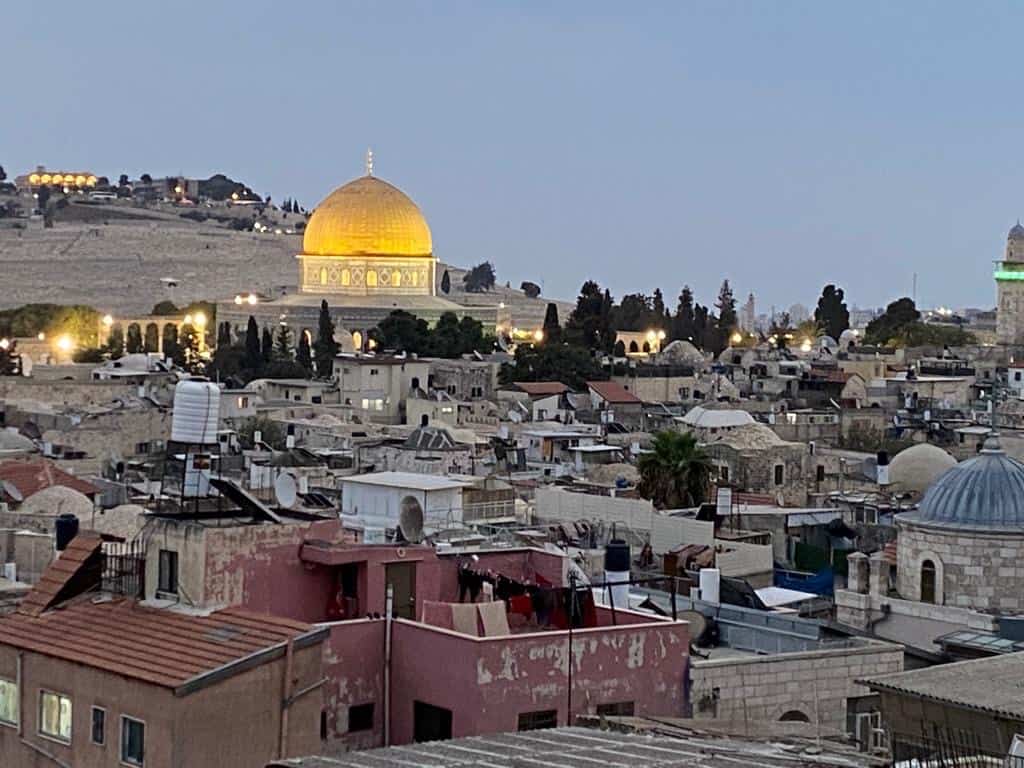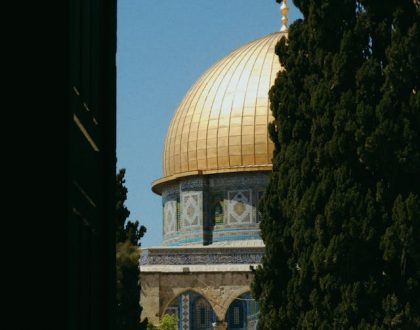Peace does not come with violence and peace does not come without dignity

The distressing situation in Palestine is a cause of deep pain for Muslims all over the world.
Nu’man bin Bashir (may Allah be pleased with them) reported that the Messenger of Allah (ﷺ) said:
مثل المؤمنين في توادهم وتراحمهم وتعاطفهم، مثل الجسد إذا اشتكى منه عضو تداعى له سائر الجسد بالسهر والحمى” ((متفق عليه))
“The believers in their mutual kindness, compassion and sympathy are just like one body. When one of the limbs suffers, the whole body responds to it with wakefulness and fever”. [Bukhari and Muslim]
In this hadith the Prophet (peace be upon him) was describing the Ummah which is now two billion people across the globe. He observed that when one part of the body is afflicted the whole body suffers because we are so connected with each other.
Palestine is one of the major limbs of our Ummah, so when Palestine grieves and suffers, we feel her pain. This pain is even more acute because we are aware that Bait al Maqdis is our holy land, the place where the Prophet (peace be upon him) ascended to the heavens. The first qibla for Muslims was Palestine. Part of our belief as Muslims is to believe in the six articles of faith and one of these is to believe in destiny. Destiny can be good or bad. Our destiny is to defend Masjid al Aqsa as it is sacred for us.
How do we as Muslims deal with the situation?
The atrocities and suffering endured by the Palestinian people have flared up with upsetting regularity, with the indiscriminate destruction of their homes, hospitals and churches, attacks on worshippers in one of our holiest sites during the most holy days of the Islamic year. We have seen the tragic and unending loss of lives, men, women and babies. What is the solution?
Peace doesn’t come without dignity
The first point we have to note in order to reach a solution is that life has to be valued equally. It is basic justice that each person regardless of their colour, race or ethnicity should be accorded the same respect, opportunities and right to life. It is a fundamental principle in Islam that all humans are descended from Adam and Eve, and no one is superior to another, except in their piety and goodness. The Universal Declaration of Human Rights (UDHR) states: “All are equal before the law and are entitled without any discrimination to equal protection of the law”.
Lasting peace will never be established anywhere where two groups of people are not afforded the same rights. Until Palestinians, like all individuals, are treated with dignity, respect, and justice, peace cannot prevail.
Key principles of human rights include:
1. Universality: Human rights are applicable to all people, regardless of their background or circumstances. They are not limited to a particular group or region.
2. Equality: Human rights uphold the principle that all individuals are equal and should be treated as such, without discrimination.
3. Inalienability: Human rights cannot be given up or taken away. They are considered intrinsic to human beings and cannot be forfeited.
4. Indivisibility: Human rights are interconnected and interdependent. They encompass civil, political, economic, social, and cultural rights. A violation of one right can often impact other rights.
5. Accountability: Governments and other entities are responsible for respecting, protecting, and fulfilling human rights. When they fail to do so, there should be the political will of other nation states to implement legal mechanisms for accountability and redress.
There is no doubt that an immediate ceasefire must be called to protect further loss of life and destruction. Aid has to be sent immediately. One million people are affected. Every drop of blood shed is one drop too many and every life snatched away ahead of its time is a profound tragedy. Every man, woman and child has the right to live freely.
Our hearts go to those who are suffering day and night, the innocent civilians enduring brutal attacks, which is a genocide and a collective punishment that violates international humanitarian laws enshrined in the Geneva convention. Our emotions are running high but unless we address the root cause of the conflict we can never achieve a solution.
Peace doesn’t come with violence
Violence does not beget peace. It is counterproductive and leads to a perpetual cycle of violence rather than creating a lasting and sustainable peace for all. Resorting to violence can never bring about the establishment of a stable and just peace. It is simple, all violence has to stop.
The UN Security Council Resolution 242, adopted in 1967 is a crucial resolution related to the Israeli-Arab conflict. It calls for the withdrawal of Israeli armed forces from territories occupied during the 1967 Six-Day War, and exhorts the recognition of the sovereignty, territorial integrity, and political independence of every state in the area, and the right of all states in the region to live in peace within secure and recognised boundaries. Until this is observed, and dignity is not restored to Palestinians, how can peace be achieved?
In Surat an-Nahl, Allah Almighty stated:
إِنَّ ٱللَّهَ یَأۡمُرُ بِٱلۡعَدۡلِ وَٱلۡإِحۡسَـٰنِ وَإِیتَاۤىِٕ ذِی ٱلۡقُرۡبَىٰ وَیَنۡهَىٰ عَنِ ٱلۡفَحۡشَاۤءِ وَٱلۡمُنكَرِ وَٱلۡبَغۡیِۚ یَعِظُكُمۡ لَعَلَّكُمۡ تَذَكَّرُون
God commands justice, doing good, and generosity towards relatives and He forbids what is shameful, blameworthy, and oppressive. He teaches you, so that you may take heed. [16:90]
We need to be patient in order to obtain lawful rights and only peace will achieve this. We raise our voices peacefully to support our brothers and sisters in Palestine. Try your best to deliver the right message to those around you. Always remember the truth is clear and we ask Allah to protect civilians everywhere and grant the oppressed relief. Ameen
Palestine the Islamic perspective
Recite the Du’a Qunut in times of calamity
- Inspirational women in Islam
- The forces of Allah and the fate of the falsifiers
- Climbing the stairs: How to continue your spiritual journey post-Ramadan
- How Allah strengthens the hearts of believers
- Why should you follow up one good action with another one?
Recommended Posts

Inspirational women in Islam
May 01, 2024

The forces of Allah and the fate of the falsifiers
April 26, 2024

How Allah strengthens the hearts of believers
April 19, 2024
